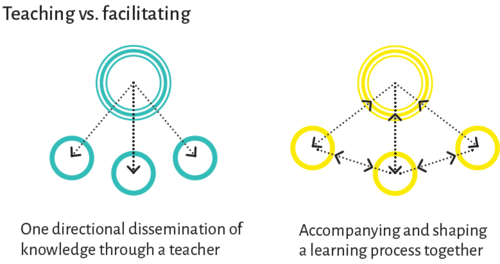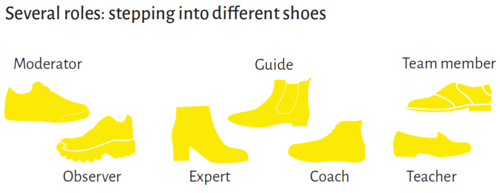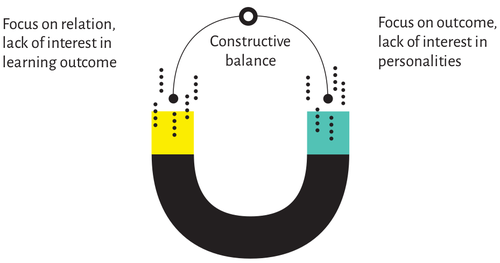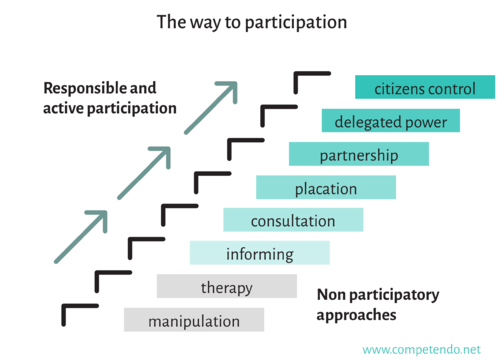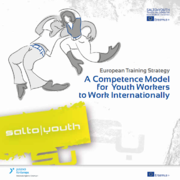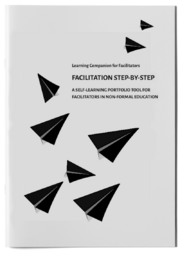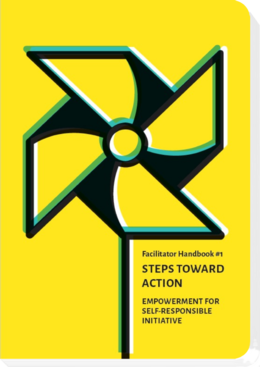From a methodological and organizational point of view, this type of education requires variability and breadth in order to respond appropriately and flexibly to situations and needs of learners. Educators are more than elsewhere companions of the learners in a process in which learning takes place on real challenges. In pedagogy, the term facilitation has come to describe this changed perspective on how to design and guide learning process.
Facilitating a training can be very different than the kind of teaching that takes place often in schools. Traditionally, a teacher is a person who primarily disseminates knowledge. Facilitation, on the other hand, involves accompanying people during a learning process in which they develop competencies. Facilitators create the right conditions for individuals to form knowledge and skills in a self-directed way, according to their specific needs. This is one aspect of empowerment. Our profession is better understood with a new definition: a shift from teaching to facilitating, moderating, and encouraging.
Contents
Recognizing Existing Knowledge
Facilitation believes in individual’s pre-existing knowledge, skills, capacities and potential. Do you trust in your learner's capacity to act successfully? This is described as Resource Orientation.
In teacher-centered learning, the teacher is the cook and hopes that the group will enjoy the dish and its ingredients. In a facilitative approach, facilitators are confident that everybody can cook. Ideally everybody receives the recipe, the ingredients and spices that help him or her best. Instruction is limited to the necessary. However, it only works when facilitators believe in learner's capacity to act successfully.
But facilitation is more than simply allowing each person to do whatever they want. Facilitators still use specific knowledge and guide learners. Just facilitation involves granting your participants’ experience and knowledge more relevance than it has in traditional teaching. In this sense, facilitation is a step toward sharing expertise and appreciation, from vertical toward horizontal knowledge acquisition.
- More: Resource Orientation.
The difference between facilitating empowerment and traditional education lies in the attitude toward the target group of people learning. A facilitative attitude actively seeks to connect experience in a seminar room with the participants' resources (life experiences, knowledge, competences, ... ) in a cooperative way.
Considering that participants or learners usually know which approaches, topics, and learning styles work well for them, facilitators' methodological skills help a group to bring their motivation and interests into play. Facilitators help learners to find motivation, identify goals, develop action strategies, reflect on their existing skills, and identify challenges.
The facilitators' moderation skills are used here also to enable the group to take responsibility in form of shared leadership. This has consequences for your position within the group. In traditional educational settings, the role of a facilitator is clear – their place is standing in front of the group. According to our philosophy, this is somewhat different: As facilitators, sometimes we still stand in front of the group, but more often we’re in the background, observing from the sidelines, acting as moderators or coaches. Sometimes participants even take the lead.
The challenge is to find the position that works best for the learning process as a whole. With regard to your role, you might face specific questions, such as: Do I need to explain something here or should I focus on active group work? What part of the explanation that I have prepared is really useful?
Relationships
When the boundaries between facilitator and participants become more fluid, challenges for facilitators can arise. Sharing the same values and vision of a participative and pluralistic civil society is a prerequisite for creating a trusting atmosphere where participants can open themselves to others.
On the other hand, situations continually crop up where facilitators have to give orientation, act as a role model, or inspire others through their own experience or expertise.
In a shared and holistic learning environment, facilitators are also included in the process, on cognitive, experiential, and emotional levels. Our relation to the participants has a direct impact on the learning process. The challenge is to establish a trusting and constructive relationship to participants while still keeping the intended outcome in mind, unless the facilitator is primarily responsible for achieving it.
In other words: We are part of the game, but are also partners with a larger responsibility for the whole.
- More: Constructive Relation
Participatory Facilitation
Shared leadership refers to participation, the various mechanisms people use to express their opinions and exert influence on social decision-making. Genuine participation takes place through partnership, in which a negotiation process is used to distribute power between facilitators and the people learning (in a civic engagement, this occurs between citizens and power holders). In this process, decision-making is shared.
For example,
- You wouldn’t just propose two alternatives, but would ask open-ended questions about what participants want to learn.
- You would let them co-decide what content and methods they would like to use.
Following this logic, the highest level of participation involves people taking action and making decisions about their situations independently. In practice, we must recognize that there are reasons that the goal of leadership cannot be to make leadership superfluous: For instance, facilitators are accountable, they have a teaching mission, the learner's want to be guided competently through a learning process.
- Delegate your power to participants and let them act as experts in front of the group.
- Maybe have learners conduct a training or unit among themselves, independently from you.
- Negotiate methodology, goals, content: Transparently contrast your own needs and goals as a trainer with those of the participants, negotiate, and make fair and reasoned decisions.
Diversity-Consciousness
Focusing on individual needs implies the insight that everybody is different. Our participants have different styles, attitudes, experiences, or cultural and social backgrounds, inherit different. They enjoy privileges or face discrimination and exclusion to varying degrees. In many everyday situations, including school systems, this diversity tends to be homogenized. Facilitation means on the one hand to respect and even to appreciate the(se) difference(s) as a resource, and on the other hand to actively respond to exclusion or discrimination. In the best-case scenario everyone gains from the realization that different roads may lead to similar goals and that it is often the other strategy that might help you in your work.
In a heterogenous society diversity consciousness is part of a transversal competence and a learning field. If we take this seriously, facilitation needs to integrate it under real life conditions, for instance under limited time resources, or in heterogeneous, not always consensus-oriented group. And when individuals or groups violate our non-violent and democratic principles – these need to be (re)established.
Dealing with differing opinions and conflict
How to navigate tensions, conflicts and dilemmas? How can we overcome the polarisation that racism, war, any kind of discrimination and other forms of violence create in our societies and in our minds? We better should acknowledge that conflict and violence exist in the world and are therefore in our learning spaces. And Therefore, facilitate the skills of learning to live with dilemmas, disagreement and conflicts is of crucial importance.
By employing good conflict management, facilitators improve the quality and efficiency of communication in a group and equip participants with conflict management skills. By employing good conflict management, facilitators improve the quality and efficiency of communication in a group and equip participants with conflict management skills:
- More: Conflict Management
Staying open to self-development
Facilitators stimulate others’ learning processes and create spaces for it. This implies the use of dynamic lenses to be able to observe group processes, foresee needs and motivations, and codesign the process accordingly. As shown in the text above this is a question of knowledge and the ability to apply methods, however to question proven or conforming ways of teaching starts with a shift in the attitude toward the learners and toward learning.
- More: Before.
Facilitation is as well a space for the facilitator's individual learning processes. Therefore, facilitators using the holistic approach develop skills and abilities to learn from a variety of experiences and in diverse contexts: formal and non-formal, group settings and individual personal interactions, outdoors and indoors, when communicating to a broader public and conveying messages but also in their own private lives. In other words, being a facilitator and imparting holistic learning, means committing to being a lifelong learner.
New paradigms of facilitation
- Resource orientation instead of deficit orientation
- Shaping cooperative and collaborative learning environments
- Emphasis on the applicability of the learning outcome
- Consciously building connections between different kind of learnings
- Mobilizing empathy for the needs of learners, accepting their positions and trying to understand them
- Training the competence of systemic thinking and of reflective (self-) observation - understanding and managing social complexity and transformations.
- Training self-competence/learning-to-learn - toward autonomy and emancipatory learning
Elke Heublein
Co-founder of Working Between Cultures. Co-author of Holistic learning. Facilitator since 2004, certified intercultural facilitator (Institute for Intercultural Communikation, LMU München) and trainer (IHK Akademie München/Westerham), adult education (Foundation University Hildesheim). Focus: Cooperation and leadership in heterogenouos teams, higher education, train-the-trainer.
Nils-Eyk Zimmermann
Editor of Competendo. He writes and works on the topics: active citizenship, civil society, digital transformation, non-formal and lifelong learning, capacity building. Coordinator of European projects, in example DIGIT-AL Digital Transformation in Adult Learning for Active Citizenship, DARE network.
Blogs here: Blog: Civil Resilience.
Email: nils.zimmermann@dare-network.eu
Good Practice
A Competence Model for Youth Workers to Work Internationally
SALTO's competence model focuses on competences needed to prepare, implement and evaluate learning in international activities.
Good Practice
Facilitation Step-by-step
A self-learning portfolio tool accompanies you during facilitation work and serves you as a documentation and planning tool.



